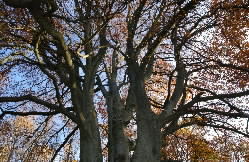
Cardinham is a small village is on the southern edge of Bodmin Moor. The parish is named after the Cornish word 'Car' (or 'Caer') meaning fort plus the word 'Dinas' also meaning fortress. The parish also contains the small villages of Millpool and Mount.
The parish church is dedicated to St Meubred, an Irish missionary who ended up being beheaded in Rome and his body being returned for burial here. There are two outstanding Celtic crosses in the churchyard, one of which is over 8ft tall. The church, which was damaged by bombs intended for Bodmin during the war. It contains some fine benchends and a 15th century brass plaque dedicated to one of the earliest rectors - Thomas Awmarie. The churchyard contains a couple of particularly fine Cornish crosses one of which dates from the 8th Century.

The Forestry Commission owns 250 hectares of mixed woodland set within a complex series of steep valleys. A car park and all ability trail have been laid out and there is a woodland cafe and woodland play
Cardinham Castle was built in 1080 by the Sheriff of Cornwall for the then Earl of Cornwall. He built the castle to protect the land that he seized shortly after the Norman conquest. He also built castles at Lostwithiel and Launceston where he lived. The castle is on high ground to the south of the church. The shape of the castle can still be seen, but no ruins remain. The site of the castle here can be visited with permission of the landowner.
St Bellarmin's Tor at the other end of the parish has the remains of a small chapel dedicated to St Bartholomew who is believed to have lived and preached there. This charming spot and can be reached by a path opposite the telephone box in the village of Millpool.
There are several ancient inscribed stones in the parish, dating back to the 5th and 6th centuries, when Christianity first came to Cornwall.
Cardinham Airfield, called usually Bodmin Airfield, is a small airfield which is the home of the Cornwall Flying Club.
Cardinham, Cornwall Genealogical information on Genuki